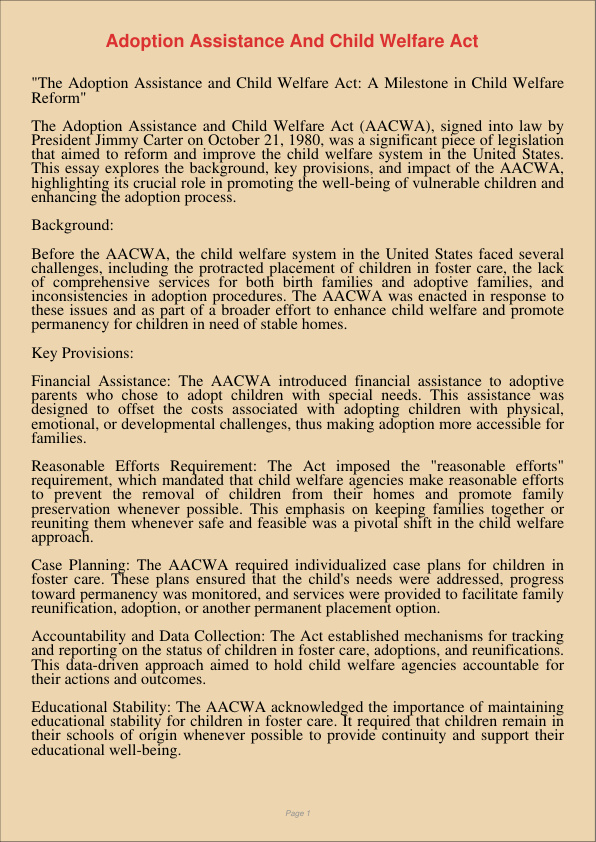“The Adoption Assistance and Child Welfare Act: A Milestone in Child Welfare Reform”
The Adoption Assistance and Child Welfare Act (AACWA), signed into law by President Jimmy Carter on October 21, 1980, was a significant piece of legislation that aimed to reform and improve the child welfare system in the United States. This essay explores the background, key provisions, and impact of the AACWA, highlighting its crucial role in promoting the well-being of vulnerable children and enhancing the adoption process.
Background:
Before the AACWA, the child welfare system in the United States faced several challenges, including the protracted placement of children in foster care, the lack of comprehensive services for both birth families and adoptive families, and inconsistencies in adoption procedures. The AACWA was enacted in response to these issues and as part of a broader effort to enhance child welfare and promote permanency for children in need of stable homes.
Key Provisions:
Financial Assistance: The AACWA introduced financial assistance to adoptive parents who chose to adopt children with special needs. This assistance was designed to offset the costs associated with adopting children with physical, emotional, or developmental challenges, thus making adoption more accessible for families.
Reasonable Efforts Requirement: The Act imposed the “reasonable efforts” requirement, which mandated that child welfare agencies make reasonable efforts to prevent the removal of children from their homes and promote family preservation whenever possible. This emphasis on keeping families together or reuniting them whenever safe and feasible was a pivotal shift in the child welfare approach.
Case Planning: The AACWA required individualized case plans for children in foster care. These plans ensured that the child’s needs were addressed, progress toward permanency was monitored, and services were provided to facilitate family reunification, adoption, or another permanent placement option.
Accountability and Data Collection: The Act established mechanisms for tracking and reporting on the status of children in foster care, adoptions, and reunifications. This data-driven approach aimed to hold child welfare agencies accountable for their actions and outcomes.
Educational Stability: The AACWA acknowledged the importance of maintaining educational stability for children in foster care. It required that children remain in their schools of origin whenever possible to provide continuity and support their educational well-being.
Impact:
The AACWA has had a profound and lasting impact on child welfare in the United States. Some of its key achievements include:
Increased Adoption Rates: The financial assistance provided to adoptive parents for special needs children encouraged more families to consider adoption. As a result, the AACWA significantly increased the number of successful adoptions of children with special needs.
Emphasis on Family Preservation: The “reasonable efforts” requirement shifted the focus from removal and institutionalization to family preservation whenever possible. This change in philosophy aimed to provide families with the support they needed to stay together.
Accountability and Transparency: The Act’s provisions on data collection and reporting have increased transparency and accountability in the child welfare system. By tracking outcomes and performance, it has become easier to identify areas in need of improvement.
Educational Stability: The emphasis on educational stability for children in foster care recognized the importance of minimizing disruptions in their lives. This provision has helped ensure that children’s educational progress is not impeded by changes in placement.
In conclusion, the Adoption Assistance and Child Welfare Act was a significant milestone in child welfare reform in the United States. By addressing the financial and service needs of adoptive families, promoting family preservation, and emphasizing accountability, the AACWA has improved the lives of countless children and families. While there is still work to be done to further enhance the child welfare system, the AACWA remains a crucial piece of legislation that has contributed to positive changes in the adoption process and child welfare practices.

「真诚赞赏,手留余香」
真诚赞赏,手留余香
使用微信扫描二维码完成支付
